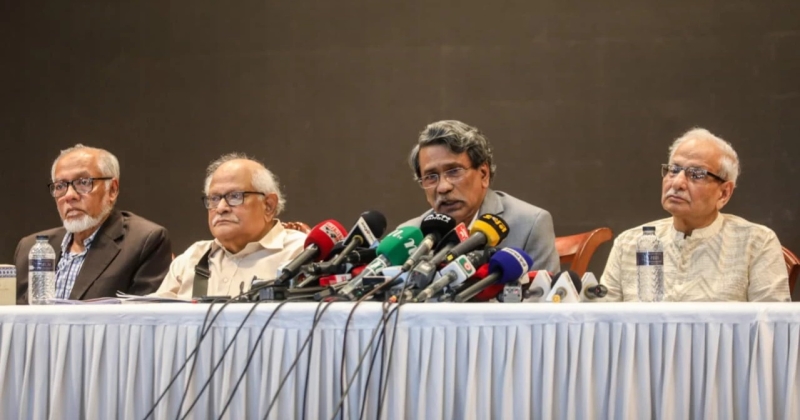- Bangladesh Bank Buys $115 Million to Support Forex Market |
- Tarique Rahman, Daughter Zaima Added to Voter List |
- NCP and LDP Join Jamaat-Led Eight-Party Alliance |
- Tarique Rahman’s gratitude to people for welcoming him on his return |
- Attorney General Md Asaduzzaman resigns to contest election |
NCC for referendum, after July Charter order promulgation

National Consensus Commission Vice-Chairman Prof. Ali Riaz addressing a press briefing in Dhaka on Tuesday. UNB_11zon
The National Consensus Commission (NCC) on Tuesday recommended the interim government to arrange a referendum following immediate promulgation of the July National Charter (Constitutional Reform) Implementation Order 2025.
“We’ve recommended the government to arrange a referendum any day till the national-election day from the promulgation of an order,” said NCC Vice-Chair Prof Ali Riaz.
He said this replying to a question at a press briefing at the Foreign Service Academy after the submission of the recommendation report over the ways to implement the national charter before Chief Adviser of the interim government and also NCC chair Prof Muhammad Yunus at the latter’s residence, State Guest House Jamuna.
Prof Ali Riaz said they placed two alternative recommendations before the interim government over how to implement the July National Charter 2025, particularly 48 reform recommendations that are related to the Constitution.
“We requested and recommended the government to promulgate an order immediately. It will be the July National Charter (Constitution Reform) Implementation Order 2025. Under this order, the government will arrange a referendum. In that referendum, we have recommended the government to place one question before the people—whether they agree to implement the order and its schedule containing 48 constitutional reform issues,” he said.
Explaining the recommendation further, Ali Riaz said a Constitution Reform Assembly will be effective simultaneously with the 13th parliament to implement the July National Charter.
But the tenure of the constitution reform assembly will be 270 days to implement the charter by bringing changes to the Constitution, he said.
“During this period, members of the Constitution Reform Assembly will carry out all necessary amendments, additions, deletions, and modifications to incorporate into the Constitution the reform recommendations contained in the July National Charter and endorsed in the referendum,” he said.
He said the elected representatives in the next general election will take oaths twice—once as members of the Constitution Reform Assembly and again as members of Parliament.
An upper house (Senate) will be formed under the proportional representation (PR) system within 45 days after the 270-day tenure of the Constitution Reform Assembly. However, political parties will not be required to disclose their candidate lists for the upper house before the upcoming general election, he added.
Talking about the alternative recommendation, Ali Riaz said the government shall promulgate an order framing a Constitution Amendment Bill on the 48 issues (incorporated in the schedule of the order) and then arrange a referendum on the order.
If the referendum secures people’s approval, the bill will assist the work of the Constitution Reform Assembly. It will not be given merely for adoption, but to serve as a guide and support in their task, he said.
“If the Constitution Reform Assembly fails to complete its tasks within 270 days, the bill approved in the vote (referendum) will automatically replace the relevant constitutional provisions,” said the NCC vice chair.
He said they firmly believe that the Constitution Reform Assembly will successfully accomplish its responsibility, and no such situation will arise where automatic implementation becomes necessary.
Prof Riaz said they strongly believe that Bangladesh’s political parties and the elected representatives of the people would play their due role in performing this historic responsibility and lead the nation toward a new democratic journey.
The referendum question will be: “Do you give your consent to the July National Charter (Constitution Reform) Implementation Order, 2025, and to the constitutional reform proposals contained in its Schedule-1?”
The 48 reform recommendations are mostly related to the presidential election, the President’s powers and clemency, the tenure of the Prime Minister, holding more than one office by the Prime Minister, the caretaker government system, formation of a 100-seat upper house (Senate) under PR election, women’s representation in Parliament, selecting the Deputy Speaker and four key parliamentary committee chairmen from opposition MPs, allowing MPs to vote freely beyond their party stance except on two occasions—financial bills and votes of confidence in Parliament—appointment of the most senior Appellate Division justice as the Chief Justice, formation of a judicial appointment commission, decentralisation of the Supreme Court to divisional levels, and specific appointment processes for the Chief Election Commissioner, election commissioners, Ombudsmen, heads and members of public service commissions, the Comptroller and Auditor General, and the Anti-Corruption Commission chairman and commissioners, declaration of emergency, expansion of basic rights of the citizen, the fundamental principles of the state.
The National July Charter 2025, however, contains a total of 84 reform recommendations, including the 48 related to the Constitution.
Prof Riaz said the NCC initially sought opinions of political parties on 166 reform proposals and held dialogues with them since March 2025. The second-phase dialogues, held since June 2025, focused on 20 fundamental constitutional reform questions.
Later, the Commission conducted the third round of talks with 30 political parties to determine the best mechanism for implementing the July National Charter.
On October 17, political parties, including BNP and Jamaat, as well as Chief Adviser and NCC Chair Prof Muhammad Yunus signed the July Charter at a festive ceremony at the South Plaza of Jatiya Sangsad, pledging to implement the reform document.
So far, 25 political parties have signed the charter, while five parties—National Citizen Party (NCP), Communist Party of Bangladesh (CPB), Bangladesh Samajtantrik Dal (Basod), Basod (Marxist), and Bangladesh Jasod—have yet to do so.
NCC members Dr Badiul Alam Majumdar, Dr Iftekharuzzaman, Justice Emdadul Haque, Safar Raj Hossain, Md Ayub Miah, Chief Adviser’s Special Assistant Monir Haider, and Chief Adviser’s Press Secretary Shafiqul Alam were present at the briefing. - UNB

